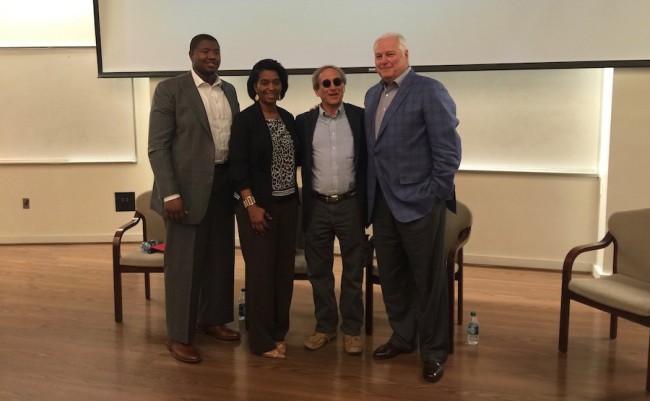Place a professional football player, an associate athletic director, a human rights director, and a sportscaster in charge of a discussion on athletes and money, and you are sure to get heads butting on the issue. That’s exactly what roughly 35 audience members engaged in Thursday night as the four speakers debated several issues in sports and their connection to human rights.

Dale Hansen, a sportscaster for WFAA, mediated the conversation between the speakers, which focused primarily on student-athlete compensation.
“I don’t think student-athletes should be paid to play,” said Monique Holland, executive senior associate athletic director for SMU. “Most of the athletes here are on scholarship and provided with amazing opportunities to do something they love. It’s a privilege to be a college athlete, not a right.”
Kelvin Beachum, who played football at SMU and now plays in the NFL for the Jacksonville Jaguars, had a slightly different take on student-athlete compensation, noting the marketing tactics that many universities use to increase revenue.
“I can see both sides of the coin, but some schools market their players so much and the athletes are unable to monetize on that, which I think is unfair,” said Beachum.
Thomas Magee, a theater major at SMU, attended the event because of his love for sports. After listening to what the speakers had to say, he didn’t think student athletes should be paid by the university, but should be able to take advantage of any marketing done in their name.
“Universities don’t owe athletes more than what their scholarship already gives them, but I do think the NCAA should allow them to capitalize on sponsorships and compensation from major deals,” said Magee after the discussion.
As the panel went back and forth, participants also touched on other human rights issues in sports, such as gender equality and Title IX.
Through the disagreements and occasional interruptions, the speakers made it clear that there is no easy solution to these ongoing problems.
According to Rick Halperin, director of the Embrey Human Rights program, the debates can be blamed on society’s failure to educate people on human rights.
“If people could talk about human rights like they talk about sports, this country would be so much better off,” said Halperin.
Even through all the differences in opinion, the speakers were able to agree on one final statement from the pro football player.
“There are a number of great athletes who do great things for our society and work to ensure that people’s rights are protected,” said Beachum.








